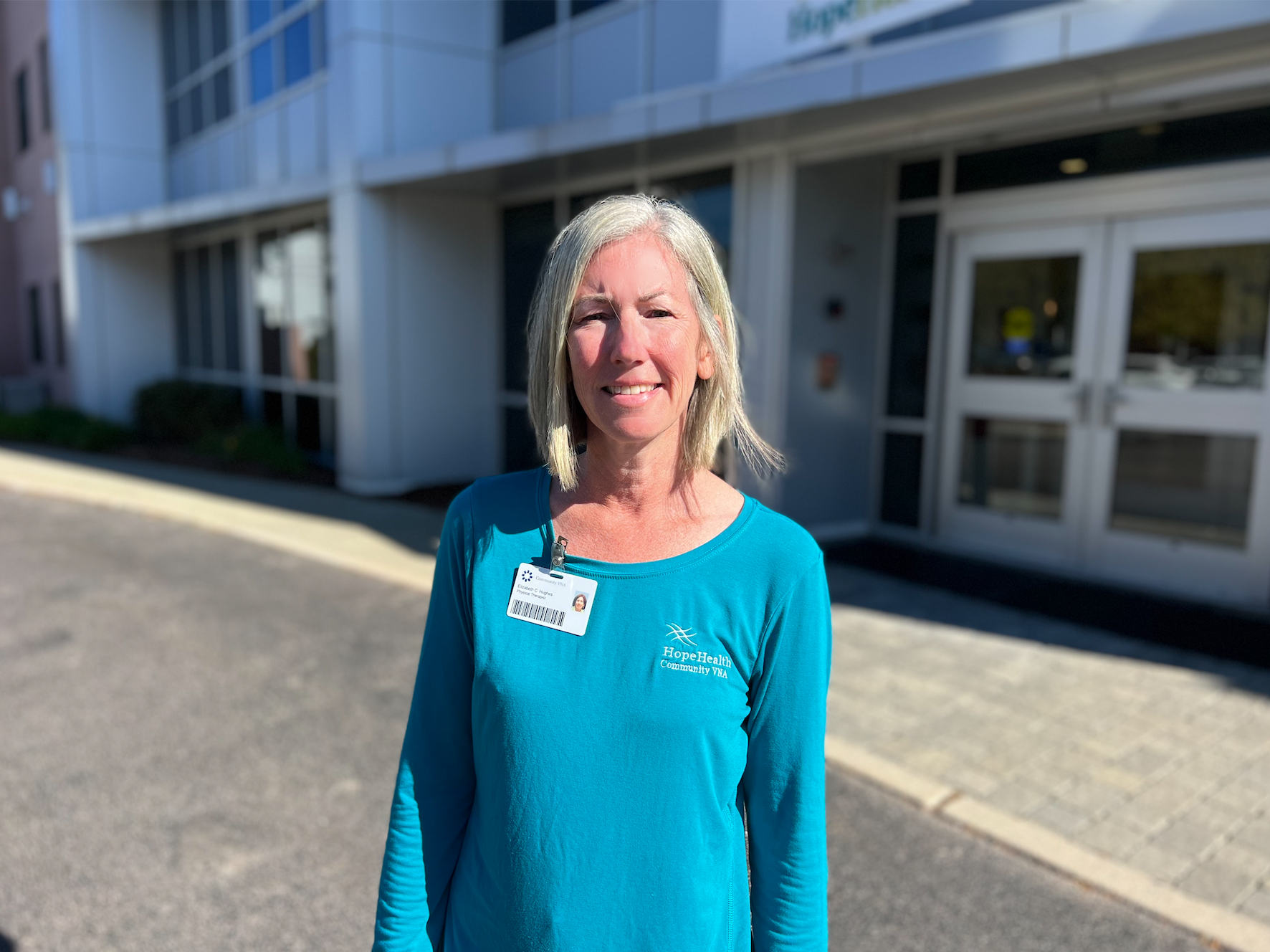Physical therapist Elizabeth Hughes knows every park and Dunkin’ on Route 44 between Seekonk and Taunton, and just about every Massachusetts town between. She drives past them regularly, as she visits a busy roster of patients who call this part of the state home.
With every completed trip, she’s made someone safer, more independent, and more empowered.
In honor of Physical Therapy Month, she shares a day in the life — and on the road — as a home care physical therapist for HopeHealth Community VNA.
> Ask about home care for you or a loved one
Physical therapy helps each patient in different ways. What’s one example?
Elizabeth: I had this 99-year-old gal with a lot of pain in her hip. She lived alone, and her family was concerned because she’d had a couple of falls. She was finding it more and more painful to move around, and was feeling stuck inside her house. One of her goals was to be able to go outside and sit on her porch.
When arthritis is causing your pain, not moving makes it worse. So we worked on exercises she could do on her own. Several times a day, she’d sit in her chair and march in place. She’d kick out her foot on the side that was bothering her. Once an hour, she’d take a short walk to the kitchen sink to look out the window. She was very diligent. As she moved more, she became less stiff and sore.
By the end of our two months together, she could use her walker to get to the end of her driveway and back. She could get outside and sit on her porch again. Her arthritis pain completely went away.
She was a lovely lady. It’s very rewarding to think of her.
What are some of the common reasons you see patients?
It runs the gamut. I see a lot of patients the day after a total knee replacement or total hip replacement surgery. Other patients are recovering after a heart attack or stroke, or after being in the hospital for COVID-19 or another illness. Some have an ongoing neurological condition, like multiple sclerosis.
Typically, I’ll spend four to eight weeks with them, often visiting a couple times a week. In that time, we focus on goals for their mobility and safety.
Safety and independence are huge, huge pieces of what we do as physical therapists. That includes recommending changes around the home, like adding a grab bar at the front door, and tackling situations that can’t change, like how to get around in a small bathroom. If a patient was independent before, could they safely be independent again — say, if they used a walker? Or do we need to work on using a wheelchair?
We want to get patients safe within their limitations, whatever those might be, so we can maximize their abilities.
Why did you choose to be a home care physical therapist?
I like seeing my patients where they’ll actually be every single day: what their stairs look like, what their door looks like, how they get into their bathroom. You can mock it all up, but to be in the environment where they’re actually living is so much more rewarding.
Plus, by seeing someone in their home, you become a part of their routine for the weeks or months you spend together. The relationship you create with them and their family is pretty special.
> Related: An occupational therapist in smallest state looks at big picture
What’s something aspiring physical therapists should know?
You have to be resourceful! Some patients are not interested in exercising, so you disguise it as, “Let’s go outside to check your garden and see what flowers are coming up.” You have to feel out what would convince them.
You have to be caring. When you’re going into a patient’s house, they have to trust you and you have to trust them. Some people want you to open the door, holler “I’m here!” and come on in. Other people, you wait at the door. Every person is so different. With the intimacy of being in someone’s house, you have to be really aware of what that person is comfortable with. You have to be tolerant and understanding of where different people come from.
Finally, it’s very rewarding. When you help anybody feel better, when you help anybody do something they couldn’t do days or weeks ago — that’s why I love what I do.
Questions about home care for you or a loved one? Contact HopeHealth Community VNA at (508) 222-0118 for services in Massachusetts or HopeHealth Visiting Nurse at (800) 696-7991 for services in Rhode Island, or email us at Information@HopeHealthCo.org

